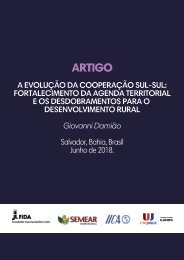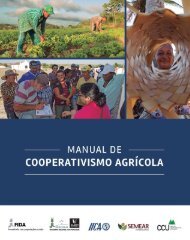The Evolution of South-South Cooperation
Since the Bandung Conference in 1955, the countries of the South have organized themselves in a structured way to achieve better levels of development. This article aims to present the evolution and recent trends of South-South Cooperation, showing how the historical dynamics have led the United Nations and its agencies to adopt a territorial approach, with a strong appeal to mobilize local actors. Allied to this, the increase of the independence of the actors that, with autonomy, manage to dialogue and conduct initiatives of cooperation outside the formal sphere of the central government. This article also aims to present rural development, agriculture and food security as essential factors for the development that since 1978, with BAPA (Buenos Aires Plan of Action), is one of the main thematic lines presented when it comes to the development of the southern agenda. Alongside this, the challenges presented by the prioritization of market dynamics in the face of social development, and how some of the multilateral agencies have worked to promote the facilitation of South-South cooperation and empowerment of minorities, in the achievement of governance as a strategy for endogenous and localized development
Since the Bandung Conference in 1955, the countries of the South have organized themselves in a structured way to achieve better levels of development. This article aims to present the evolution and recent trends of South-South Cooperation, showing how the historical dynamics have led the United Nations and its agencies to adopt a territorial approach, with a strong appeal to mobilize local actors.
Allied to this, the increase of the independence of the actors that, with autonomy, manage to dialogue and conduct initiatives of cooperation outside the formal sphere of the central government. This article also aims to present rural development, agriculture and food security as essential factors for the development that since 1978, with BAPA (Buenos Aires Plan of Action), is one of the main thematic lines presented when it comes to the development of the southern agenda. Alongside this, the challenges presented by the prioritization of market dynamics in the face of social development, and how some of the multilateral agencies have worked to promote the facilitation of South-South cooperation and empowerment of minorities, in the achievement of governance as a strategy for endogenous and localized development
Create successful ePaper yourself
Turn your PDF publications into a flip-book with our unique Google optimized e-Paper software.
REFERENCES<br />
AGOSTINHO, Francisco Paulo. GUERRA EM ANGOLA AS HERANÇAS DA LUTA DE LIBERTAÇÃO E A<br />
GUERRA CIVIL. Lisboa: [s.n.], 2011. 78 p. Recuperado el 6 de junio del 2018 de:<br />
.<br />
AMANOR, Kojo S.; CHICHAVA, Sérgio. <strong>South</strong>–<strong>South</strong> <strong>Cooperation</strong>, Agribusiness, and African<br />
Agricultural Development: Brazil and China in Ghana and Mozambique. [S.l.]: Elsevier, 2016. 11 p.<br />
Recuperado el 16 de junio del 2018 de:<br />
.<br />
AYERBE, Luis Fernando. Estados Unidos e América Latina: a construção da hegemonia. São Paulo:<br />
UNESP, 2002. 301 p.<br />
BONNAL, Jean et al. EL DESAROLLO TERRITORIAL PARTICIPATIVO Y NEGOCIADO (DTPN): LA<br />
FACILITACIÓN PARA LA GOBERNANZA TERRITORIAL. [S.l.: s.n.], 2013. 71 p. Recuperado el 10 de<br />
junio del 2018 de: .<br />
BRIEGER, Pedro. De la Década Perdida a la Década del Mito Neoliberal. [S.l.: s.n.], [2005-?]. 54 p.<br />
DANTAS, Rafaela Maximiano; COSTA, Micheli Pereira. TERRITÓRIOS RURAIS NO BRASIL E SUAS<br />
ESTRATÉGICAS DE DESENVOLVIMENTO. Alfenas, MG: [s.n.], 2014. 10 p. Recuperado el 19 de mayo<br />
del 2018 de:<br />
.<br />
FERRANTI, David et al. Beyond the City: <strong>The</strong> Rural Contribution to Development. Washington D.C:<br />
THE WORLD BANK, 2005. 264 p. Recuperado el 16 de junio del 2018 de:<br />
.<br />
24




